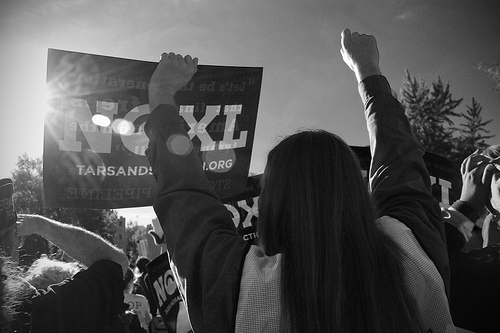- Home
- Climate & Energy Justice
- Fossil Fuels
- Killing the Keystone XL Pipeline
Killing the Keystone XL Pipeline

After over a decade of grassroots opposition and legal hurdles, the Keystone XL pipeline has finally met its demise. Initially proposed by Canadian oil company TC Energy, the pipeline would have spanned over 1,700 miles and carried 35 million gallons of tar sands oil a day across the border from Canada to Texas.
Since its proposal, the project has faced strong opposition from environmental, Indigenous, and local activists concerned about its climate and environmental justice impacts. If fully constructed, the pipeline would have crossed through rivers, streams, and wetlands that are sacred to Indigenous peoples and provide habitat for at least 20 rare and endangered species like whooping cranes, pallid sturgeons, and piping plovers. The northern leg of the pipeline would have passed directly over the Ogallala Aquifer – a crucial source of drinking water for millions of Americans and a major source of water for agriculture.
On top of that, tar sands oil production emits higher levels of greenhouse gases and toxic air pollutants compared to conventional oil production, intensifying the pipeline’s climate-destroying effects and increasing public health risks for frontline communities. This project was a catastrophe in the making.
From the moment Keystone XL was announced, Friends of the Earth got to work fighting the destructive pipeline. Throughout the project’s decade-long lifespan, we went to court multiple times for violations to our bedrock environmental laws, including the National Environmental Policy Act, Clean Water Act, and Endangered Species Act. Using the Freedom of Information Act, we became the first national group to hold President Obama accountable for climate action and call the pipeline a litmus test on his climate leadership. From these efforts, we successfully pressured the State Department to conduct a thorough evaluation of the pipeline’s social and environmental impacts, which helped to delay the project indefinitely.
Things seemed to take a turn when Donald Trump rubber-stamped an approval for the pipeline – but that only drove us to fight back even harder. Collectively, nearly 50,000 Friends of the Earth members sent comments to the State Department demanding it block the pipeline from moving forward. An additional 23,000+ members wrote letters to Wells Fargo, one of Keystone XL’s biggest investors, urging it to stop funding the project. And we can’t forget the hundreds of activists who showed up at rallies and protests across the country calling for the pipeline’s cancellation.
All of this hard work culminated in President Biden rejecting a critical permit needed to push the project forward. And just a few months later, TC Energy officially pulled the plug on the pipeline!
This was a victory over ten years in the making. It would not have happened without the dedication of our member activists to fight the environmental injustice, climate destruction, and oppressive corporate power that the Keystone XL pipeline stood for.
When we work together, we win!
